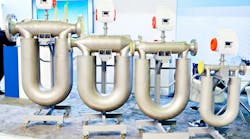The National Science Foundation (NSF, www.nsf.gov) awarded Iowa State University (www.iastate.edu) and its partners $18.5 million over the next five years to establish a new NSF Engineering Research Center (ERC) for Biorenewable Chemicals.
The NSF Engineering Research Center for Biorenewable Chemicals (CBiRC) seeks to transform the existing petrochemical-based chemical industry to one based on renewable materials. Nature uses enzymes as biocatalysts to convert sugars into various chemicals, which chemical catalysts can then turn into the desired chemical products. The production of industrial chemicals from renewable materials such as plants is still in its infancy, and significant fundamental understanding and technological developments of new bio- and chemical catalytic systems are required. CBiRC”s research will focus on understanding and exploiting the integration of biocatalytic and chemical catalytic technologies to efficiently produce biorenewable chemicals. With projected long-term increases in the price of oil, developing cost-effective and sustainable alternatives to petroleum-based catalysts is essential to the viability of the chemical industry and to the nation.
According to the NSF, the new processing paradigms with biorenewables will necessitate educating and training engineers and scientists who can look beyond conventional chemical production approaches and compete in a global economy. CBiRC educational programs will address this need through a suite of undergraduate courses, student research projects, and a new graduate minor in biorenewable chemicals.
CBiRC will be based at Iowa State University (ISU), in partnership with Rice University, the University of California at Irvine, the University of New Mexico, the University of Virginia, and the University of Wisconsin at Madison. Fritz Haber Institute of the Max Planck Society in Germany and the Technical University of Denmark will contribute additional expertise and international connections.
Nine industry partners will guide CBiRC”s strategic planning for research and education and technology transfer. In addition, start-up firms will carry out translational research in partnership with the faculty and students. The ISU Pappajohn Center for Entrepreneurship and venture capital firms will further stimulate innovation and entrepreneurship.

